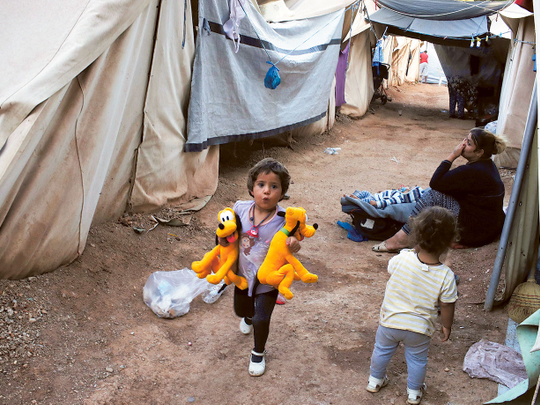
Dubai: When world leaders meet in the United Nations (UN) on Monday in an unprecedented summit to try and resolve what to do with the more than 65 million people living as refugees, they will have one eye on the issue — and another on the political forces that are opposed to rolling out the welcome mat for the desperate.
Already human rights groups say the summit’s goals fall far short of what’s needed to deal with the world’s worst refugee crisis since the end of the Second World War.
In separate statements, Human Rights Watch called the draft of the final document “a missed opportunity”, and Amnesty International accused member states of stripping away any proposals of substance.
“The UN summit has been sabotaged by states acting in self-interest, leaving millions of refugees in dire situations around the world on the edge of a precipice,” said Salil Shetty, Secretary General of Amnesty International.
Amnesty said the outcome document had been rendered toothless after member states removed a clause asking governments to resettle 10 per cent of the world’s refugees each year, thus making sure there was no obligation to take in a specific number of people.
Leaders from around the world will meet in New York on Monday to discuss what to do about the world’s refugees. The next day, US President Barack Obama will host a “Leader’s Summit”, in hopes of raising money for refugee initiatives.
“Millions of lives hang in the balance,” said Kenneth Roth, executive director of Human Rights Watch. “This is not just about more money or greater resettlement numbers, but also about shoring up the legal principles for protecting refugees, which are under threat as never before.”
Human Rights Watch said it was particularly concerned about the risk to the bedrock foundation of refugee protection: not forcibly returning refugees to places where they would face persecution.
The group said, so far this year, it has documented cases of refugees pushed back at borders in Jordan and Turkey and the harassing and deregistering of Afghan refugees in Iran and Pakistan. Kenya has also declared that it will close the world’s largest refugee in camp pushing Somalis to return home.
After more than 1 million people poured into the continent in 2015, High Commissioner for Refugees Filippo Grandi said in an interview that it is time for the European Union (EU) to engage in a reasoned debate on the issues of refugees that tore at its core.
“There’s a time now to have this rational discussion — beyond the politicisation of some of these issues, beyond the manipulation that some irresponsible politicians are carrying out, using this pretext to just get votes,” Grandi said.
“More thinking and more resources” should go into the integration of refugees, he said, because if done properly, it could “counter xenophobic tendencies, violent rejection and propaganda against foreigners.”
One of the important “deliverables” in New York will be to promote “the notion of acceptance and inclusion,” Grandi said.
“We believe the time has come to look at integration programmes more systematically, and this is, I think, one of the great challenges of the future,” said Grandi, an Italian who previously headed the UN agency for Palestinian refugees and took over at UNHCR in January.
The influx to Europe has slowed, all but drying up through the favoured route of last year — via Turkey across the Aegean to Greece — though hundreds of refugees still risk the far deadlier trek between Libya and Italy.
The massive inflows last year prompted a red-hot debate that ripped at the EU’s fabric because countries like Germany and Austria were more welcoming, Greece and Italy more burdened, and a number of mostly eastern European countries resistant to take in asylum seekers.
Work remains. Fewer than 4,000 people have been relocated from Greece and Italy out of the 160,000 that their EU partners had agreed to take in at the height of the crisis last year, Grandi said, but the relocation programme was “picking up a bit.”
Grandi says Europe also needs to handle possible rejections of asylum requests “with efficiency, so that people don’t end up in limbo and disappear.”
In the first quarter of 2016, the bloc granted asylum to nearly 90 per cent of Syrian applicants, to about three-fourths of Eritrean applicants, and 62 per cent of Iraqi applicants, according to the EU’s statistics agency.











